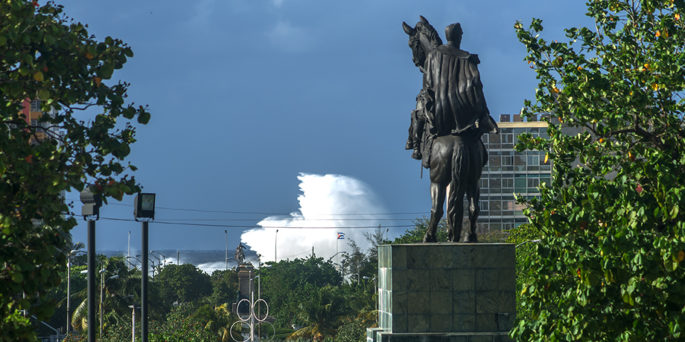
Escape valve
HAVANA — While [last week’s] cold-air front whips up strong winds, tumbles trees, knocks down power lines and the waves flood the streets along the coast line of Havana, the capital’s residents proceed at their daily pace.
The weather forecasts are no longer closely followed by those Cubans who prepared their furtive departures toward Florida. The elimination of the provision called “dry-feet-wet-feet” inevitably forces the stealthy emigrants to look for other ways to find other destinations, because Mexico is already repatriating them.
What will those who hope to emigrate do? What alternatives do they have?
The first one, according to some hopefuls, would be to seek European destinations, but those countries make the established requirements more strict from one day to the next. Finding doors is difficult.
The other choice — “some choice,” some grumble — is remaining on the island, and here’s where some journalists and analysts say that the repeal of the “feet” policy blows back into the situation in Cuba, increasing the domestic pressure because the Cubans who have sought The American Dream have done so for political, not economic reasons.
I accept that statement, so long as it’s applied equally to the motives that have led millions of Mexicans and thousands of Dominicans and Salvadorans to the United States. Those countries are not governed by Castroism, are they? No, the migrants come from countries whose political and economical structures are unlike Cuba’s. So?
Primarily, the force that propels those migrants is the quest for better living conditions and a better outlook on life, regardless of whether they come from countries with an open economy and a neoliberal model or if they’re Cubans working in the state economy, with some few instances of private or personal initiative. That said, let’s look at the question of whether domestic pressure will increase in Cuba, as some people predict.
My opinion is part of a basic belief that, at the time that Cuba entered into agreements with the United States and likely knew ahead of time that the famous policy would be repealed (the Cuban negotiators “forcefully” discussed some aspects of its components, former President Obama said) the Cubans had already evaluated the benefits and consequences.
It would be odd if they did not anticipate the possible impact on Cuban society.
The readers can describe the Havana government any way they want to, but describing as fools or political suicides people who have been in power for decades — well, really. Add to this the fact that every repression has a limit beyond which it produces an impassable rupture. At a minimum, such a rupture generates widespread anemia, which is quite the opposite of what the Cuban government needs in the present situation, i.e., an economy in recession (minus 0.9 percent).
By the way, why did Ben Rhodes, Deputy National Security Advisor, really come to Cuba a couple of weeks ago? He was one of the key men in the negotiations that ended with the announcement of Dec. 17, 2014. Did he come for cultural reasons and to witness the signing of legal papers, such as those about U.S.-Cuba collaboration in the event of oil spills in the Gulf of Mexico?
One might think that Havana has drafted answers for the domestic economy that it has still not enacted. And these would be the domestic valve; our leaders need only to speed them up and give them more flexibility, without the risk of losing political control.
I respect the opinions of other journalists and analysts. But closing the circle on their exclusive opinions would be like looking at only one side of the coin and not the other, which might be counterfeit.
[Photo by Carlos Ernesto Escalona Martí / Kako]

